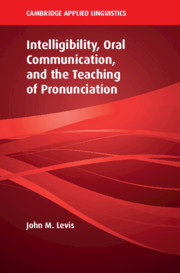
-
Select format
-
- Publisher:
- Cambridge University Press
- Publication date:
- September 2018
- October 2018
- ISBN:
- 9781108241564
- 9781108416627
- 9781108404013
- Dimensions:
- (228 x 152 mm)
- Weight & Pages:
- 0.63kg, 316 Pages
- Dimensions:
- (228 x 152 mm)
- Weight & Pages:
- 0.52kg, 316 Pages
You may already have access via personal or institutional login- Series:
- Cambridge Applied Linguistics
Book description
A proper understanding of intelligibility is at the heart of effective pronunciation teaching, and with it, successful teaching of speaking and listening. Far from being an optional 'add-it-on-if-we-have-time' language feature, pronunciation is essential because of its tremendous impact on speech intelligibility. Pronunciation dramatically affects the ability of language learners to make themselves understood and to understand the speech of others. But not all elements of pronunciation are equally important. Some affect intelligibility a great deal, while others do not. With a strong emphasis on classroom practice and how pronunciation teaching can be more effectively approached in different teaching contexts, this book provides an important resource for pronunciation researchers, with a distinctly practical focus. It shows how intelligibility research informs pronunciation teaching within communicative classrooms, enabling language teachers to incorporate intelligibility findings into their teaching. Professionals interested in oral communication, pronunciation, and speech perception will find the book fascinating.
Reviews
‘A superb, timely, user-friendly contribution synthesizing knowledge and advancing practical guidelines on the burning question of the linguistic factors to target to promote intelligibility. Highly recommended for all educational practitioners concerned with enhancing learners' spoken English interactions, including as a core resource for teacher training.'
Talia Isaacs - University College London
Contents
Metrics
Altmetric attention score
Full text views
Full text views help Loading metrics...
Loading metrics...
* Views captured on Cambridge Core between #date#. This data will be updated every 24 hours.
Usage data cannot currently be displayed.
Accessibility standard: Unknown
Why this information is here
This section outlines the accessibility features of this content - including support for screen readers, full keyboard navigation and high-contrast display options. This may not be relevant for you.
Accessibility Information
Accessibility compliance for the PDF of this book is currently unknown and may be updated in the future.


